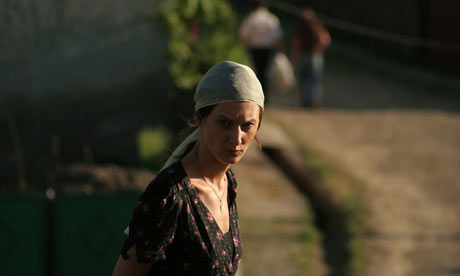
Peter Strickland is the director who was this year’s leftfield discovery at the Berlin film festival: an auteur from the UK who’d sprung, confident and fully formed, out of nowhere. Like Thomas Clay with his enigmatic Thai picture Soi Cowboy, he had succeeded in making a bold and accomplished film outside this country (his debut, in fact) and entirely outside the public-subsidy radar. With heroic effort and a family legacy, Strickland had climbed the treacherous peak of independent movie-making, and he hadn’t had so much as a brass farthing from the UK Film Council. It leaves our film establishment to ponder the question of whether it should therefore be embarrassed by or proud of a British director who is independent in the truest sense.
Strickland’s film is intriguing: a slow-moving, insistently gripping, faintly Dostoyevskian tale of violence and retribution set in the swooningly photographed Romanian countryside. It’s the sort of film that looks as if it is going to drift dreamily away in an arthouse torpor; in fact, it comes to a satisfying narrative crunch. There is actual suspense, of a sort. It’s a woozy noir, with a hint of the supernatural.
Hilda Péter plays Katalin Varga, a young woman in a remote village with a small son; she is seen in a state of some distress. Evidently her husband (Laszlo Matray) has “found out”. But found out what? He angrily denounces her as a “whore” and says that she should leave, and take her son with her. Katalin and 10-year-old Orbán (Norbert Tankó) make their desolate journey on a horse-drawn wagon, and their lonely departure makes a melancholy, almost Hardyesque spectacle, photographed in long-shot in rolling hills and fields that have clearly not changed in centuries, in which mobile phones are the only clue to the period. She asks some teenage girls the way to a village called Jadzereda, and thanks them for the directions. “Don’t mention it,” one replies derisively. “Never thank anyone who leads you to Jadzereda.” Later, staying the night in a grim cowshed, Katalin explains to the boy why she is so depressed: “I just miss my husband, that’s all.” The reply leaves Orbán more distressed than ever: “You mean Papa don’t you? Why didn’t you call him Papa?”
Katalin’s exposure triggers in her a need to conclude some unfinished business. During her travels to fiercely unwelcoming rural communities, she tracks down an unpleasant man called Gergely (Roberto Giacomello) and then another man called Antal (Tibor Pálffy). She knows precisely who they are – but they appear to have only the haziest recollection of her. At all events, these encounters turn the story into a chase movie in which Katalin is both hunter and hunted.
It is when Katalin and young Orbán are given hospitality from Antal and his charming wife Etelka (Melinda Kántor) that Strickland’s weird, cold, unexpected tension exerts its grip. Etelka strikes up an intimate friendship with Katalin and confesses to her that she has been unable to have children with her husband, and wonders whose fault it is. Katalin knows the answer, for reasons that she discloses in a bizarre scene in which she is taken boating by the couple, and in an extraordinary monologue, on the edge of hallucination, recalls the awful thing done to her 10 years earlier in a nearby forest.
Apart from the literary influences, Strickland must surely have taken something from the severe and austere cinema of Béla Tarr, whose films move at a glacial pace, but which, weirdly, have plots which could be thrillers and noirs. The rackety bars here are the location for much central European-style hillbilly-sinister dancing, promising a violent denouement in the darkness outside. It is very like Tarr, and the suspicious farmer who first lets Katalin and Orbán stay overnight is Tarr-ed with that brush. With his neck brace and his moment of semi-nudity in a pair of horribly tiny underpants, he is scary and funny – but mostly scary.
Strickland’s film-making steers away from Tarr’s tendencies towards indulgence and conceit, however. He keeps the storylines reasonably taut and his characters are capable of normal human smiling. Péter’s performance is not catatonic-deadpan in the cliched, high arthouse style: she can be the harassed refugee, or the pained single mother, or the seducer, and her face seems to change radically in each incarnation, as if in the grip of the classic abuse-victim’s multiple personality disorder. It’s the kind of story that could be happening in the city, not the country, on concrete pavements and in the glare of neon rather than sylvan hillsides and golden sunsets. This is a film that glows from the inside with its own awful secret.
• This article was amended on 12 October 2009. The original said that the film was shot in the Hungarian countryside, and that Katalin Varga’s husband was played by Florin Vidamski. This has been corrected.

